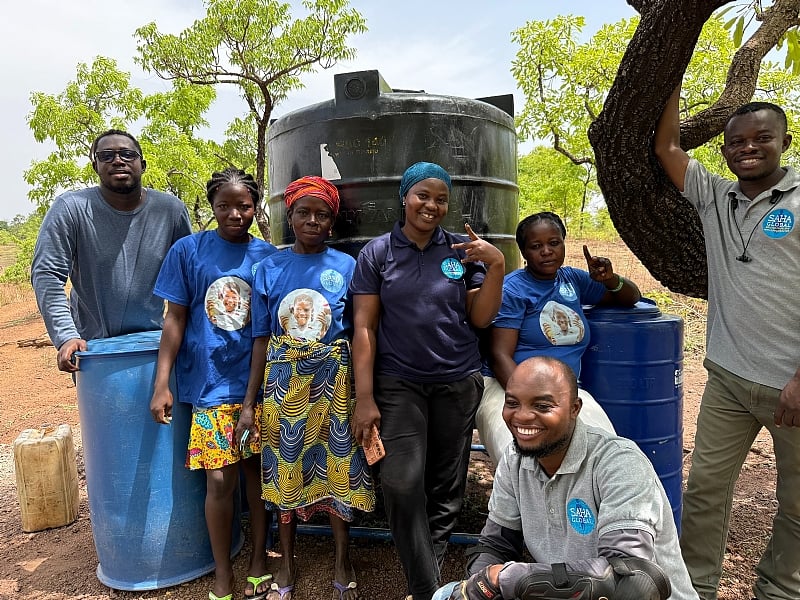Saha Global, a non-governmental organization committed to providing clean and safe drinking water to underserved communities, has embarked on a crucial zonal tour across four regions of Ghana: Oti, Volta, Northern, and Savannah. This strategic initiative is part of Saha Global’s ongoing efforts to refine and strengthen its Water Safety Plan, tailoring it to the specific environmental and social contexts of each region, particularly in remote rural areas where access to safe water remains a significant challenge. The tour facilitated vital collaborations and knowledge exchange between Saha Global and local government stakeholders, including Environmental Health and Sanitation Offices in districts such as Central Gonja, Krachi East and West, East Gonja, Nanumba North, Yendi, and Zabzugu. This direct engagement with local authorities is crucial for understanding the nuances of each region’s water challenges and ensuring the effectiveness of Saha Global’s interventions.
The zonal tour revealed a disparity in sanitation conditions across the regions. While the Volta and Oti regions demonstrated generally satisfactory sanitation practices, the Savannah Region presented more significant concerns. Observations highlighted the prevalence of open defecation and littering along riverbanks, coupled with farming activities in close proximity to water sources. These practices pose substantial risks of contaminating water sources and jeopardize the health of communities reliant on these resources. This underscores the importance of region-specific adaptations to the Water Safety Plan, recognizing the unique challenges presented by different environmental and social practices. Addressing these region-specific challenges requires targeted interventions and collaborative efforts with local stakeholders to mitigate risks and promote sustainable water management practices.
The insights gained from the zonal tour are crucial for developing targeted interventions. The identified challenges in the Savannah Region, particularly the contamination risks arising from open defecation, littering, and farming activities near water sources, necessitate a multi-pronged approach. This includes community education and awareness campaigns on proper sanitation practices, promoting alternative farming methods that minimize water contamination, and advocating for improved waste management systems. Collaboration with local authorities and community leaders is essential to implement these interventions effectively and ensure their long-term sustainability.
Saha Global’s commitment to continuous improvement is evident in its annual review and update of its Water Safety Plan. This new initiative to create zone-specific addenda further strengthens this commitment. By tailoring the plan to the unique environmental and social dynamics of each region, Saha Global aims to enhance the effectiveness of its water safety interventions and ensure they are aligned with local realities. This localized approach is crucial for addressing the specific challenges faced by each community and promoting sustainable solutions for long-term water security. The zone-specific addenda will provide a framework for implementing tailored interventions, addressing the specific contamination risks identified in each region.
The collaboration between Saha Global and local government stakeholders is crucial for the success of this initiative. Mr. Yahaya Mohammed, Environmental Health and Sanitation Director at the Yendi Municipal Assembly, expressed his office’s readiness to support Saha Global’s efforts. This commitment from local authorities demonstrates the shared responsibility for improving water safety and sanitation in these regions. By working together, Saha Global and local authorities can leverage their expertise and resources to implement effective solutions and achieve lasting improvements in water quality and community health.
Saha Global’s dedication to providing safe water access extends beyond simply installing water treatment systems. They empower local communities by training women to manage and operate these systems, ensuring long-term sustainability and community ownership. Currently, Saha Global supports over 400 rural communities, training more than four women in each community. This capacity-building approach ensures that the communities themselves are equipped to maintain and operate the water treatment systems, fostering self-reliance and promoting long-term access to safe water. By focusing on women’s empowerment, Saha Global recognizes the significant role that women play in water management and community development. This holistic approach, combining infrastructure development with community engagement and training, is at the heart of Saha Global’s mission to deliver professionally managed, safe water services to rural populations in Ghana.














